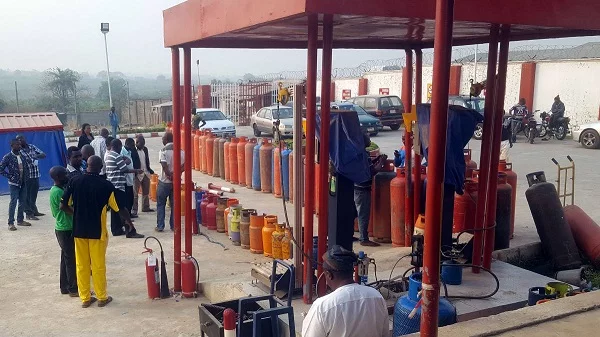The cost of cooking gas in Nigeria has seen a slight reduction, following new price adjustments at depots across the country. However, consumers continue to face heavy financial pressure as retailers maintain wide profit margins, leaving households with little relief despite falling wholesale prices.

Depot Prices Fall, But Logistics Drive Costs Up
Fresh market data indicate that depot prices have dropped significantly, largely driven by supply from the Dangote Refinery.
- Major depots such as 11Plc, Ardova, NIPCO, and Rainoil now sell Liquefied Petroleum Gas (LPG) at around ₦840 per kilogram, while NAVGAS offers slightly lower at ₦830 per kilogram.
- Dangote Refinery recently slashed its own price to ₦760 per kilogram, undercutting competition and signaling a potential market shift.

Despite these reductions, additional costs — including trucking (₦200,000 per truck) and loading/handling (₦50,000) — push the landing cost in Lagos to about ₦890 per kilogram.

Retailers’ Margins in Lagos and Ogun
In Lagos and Ogun states, retailers are reaping massive profits as they sell to end-users at:
- ₦1,200 per kilogram in Lagos
- ₦1,300 per kilogram in Ogun
This translates to a profit margin of:
- ₦310 per kg in Lagos, earning about ₦1.55 million per 5,000kg truckload (roughly 35% return).
- ₦410 per kg in Ogun, with profits climbing to ₦2.05 million per truckload.

As a result, households now pay:
- About ₦14,400 to refill a 12.5kg cylinder in Lagos
- About ₦15,600 in Ogun State
Impact on Consumers
With household budgets already strained, many families are resorting to rationing gas or turning to alternatives such as charcoal and firewood. Experts warn that this shift carries significant health and environmental risks.

Dangote’s Direct-to-Market Strategy
Industry stakeholders believe that Dangote’s move to supply gas directly to retail outlets could curb profiteering and stabilise the market.
- At ₦760 per kg, Dangote’s entry price is far below the current ₦840 depot rate.
- If passed on fairly to consumers, this could save households about ₦480 per 12.5kg cylinder, translating to ₦4,800 annually per household.
Given that over 12 million Nigerian households rely on LPG, the potential ripple effect on consumer welfare is substantial.

The Way Forward
While retailers often cite logistics and overhead costs as justification for high prices, analysts argue that current profit margins reveal a market heavily skewed in favor of sellers.
Stakeholders are now pushing for new supply chains and direct-to-customer models to restore balance, reduce exploitation, and ease the burden on Nigerian households.




